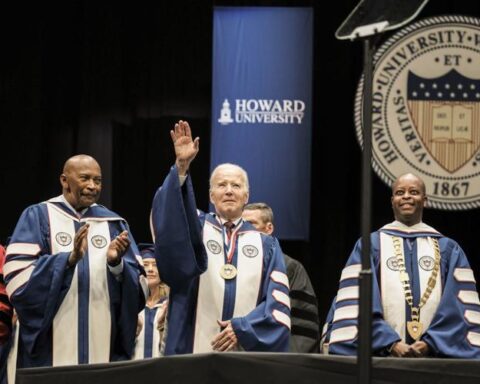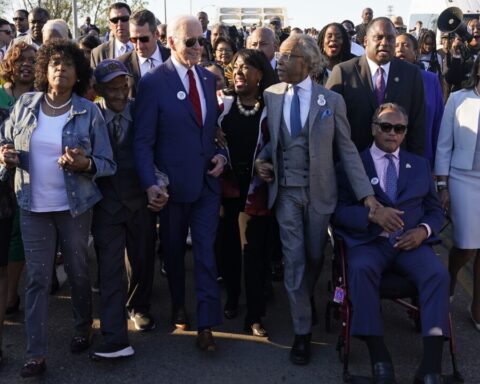President Joe Biden offered to bring his price tag on an infrastructure package down to $1 trillion but wants to ensure it amounts to “new money” — not redirected from funding already approved by Congress as Senate Republicans have been demanding, according to a GOP source briefed on the talks.
Biden also reiterated his call for new taxes to pay for much of his plan, the source said. It’s the latest sign of the major gulf between the two parties as they try to cut an infrastructure deal.
The offer made to Republican Sen. Shelley Moore Capito of West Virginia amounts to a reduction of the Biden administration’s $1.7 trillion proposal but a dramatic increase from the latest offer made by Republican senators. Capito and her group of fellow Senate Republicans have proposed a $928 billion infrastructure package, with $257 billion in new spending.
Republicans are considering making another counteroffer on Friday, the source said.
A White House official couldn’t be reached for comment.
The $1 trillion figure is in line with what Republicans said Biden had floated privately to them, CNN has reported. The White House has also been opposed to redirecting unused covid-19 relief money to pay for an infrastructure package, as Republicans have proposed. Republicans remain strongly opposed to tax hikes to pay for the plan.
Biden met with Capito at the White House on Wednesday as part of ongoing discussions between his administration and the Senate GOP on infrastructure.
“This afternoon, the President hosted Senator Capito for a constructive and frank conversation in the Oval Office about how we can drive economic growth and benefit America’s middle class through investing in our infrastructure. The two agreed to reconnect on Friday,” a White House official said in a statement.
Capito’s communications director, Kelley Moore, said in a statement that during Wednesday’s meeting, “Capito and President Biden discussed the latest of several counteroffers Republicans have put forth and how they can come together to reach a bipartisan agreement.”
The senator’s office said she was “encouraged that negotiations have continued” and that Capito will be briefing other Senate Republicans negotiating on infrastructure on the White House meeting.
“Senator Capito reiterated to the President her desire to work together to reach an infrastructure agreement that can pass Congress in a bipartisan way,” the statement continued. “She also stressed the progress that the Senate has already made.”
Capito is leading negotiations on infrastructure on behalf of Senate Republicans.
White House press secretary Jen Psaki had indicated earlier on Wednesday that the meeting with Capito was not likely to be “an exchange of paper” but “more of a discussion.” She also said “at least a portion” of the meeting would be one on one, “if not the whole meeting.”
Biden has indicated he would be open to discussing a $1 trillion infrastructure and jobs plan, senators have told CNN. But even after trading counteroffers, Republicans and the White House still have sharply different views about the size and scope of the proposal and how it would be paid for.
The President has said he would prefer to strike a bipartisan deal on the proposal, but he has also made clear he is not willing to sharply scale back the full scope of the plan.
Transportation Secretary Pete Buttigieg said over the weekend that there needs to be “a clear direction” on infrastructure talks by the time Congress returns from its recess next Monday.
Senate Minority Leader Mitch McConnell, a Kentucky Republican, said Wednesday he is hopeful GOP negotiations with the Biden administration on a giant infrastructure package will be successful and that Republicans believe the key to a deal is to “repurpose” large amounts of unspent funds allocated to spur the economy during the Covid-19 pandemic.





